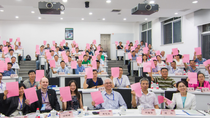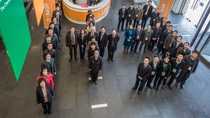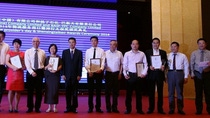Grow responsibly with the suppliers
Business is ever changing. The traditional buyer/seller relationship that used to be the predominant rule in the past is increasingly becoming a more collaborative one. This also applies to BASF’s relationship with the suppliers – improving sustainability of the sourcing practices together with suppliers has become a way to minimize risks and to achieve a win-win future.
Several days before attending the first Shanghai conference of Together for Sustainability (TfS) which is a global initiative aiming at improving sustainability sourcing practices in the chemical supply chain, Johnny Kwan, Senior Vice President, Country Platform and Functions BASF Greater China, received an exciting e-mail from a supplier who just passed the TfS audit.
This means they have been assessed as a qualified supplier who fulfilled a list of ecological and social requirements endorsed by several multi-national chemical companies including BASF.
“The supplier could not be happier about this result, so am I,” said Kwan. “If it was ten years ago, we’d never expect a small-medium-enterprise in China to care so much about their performances in environment, social and governance (ESG) – speed and cost were the keywords then.”
As Kwan put it, the behaviors of the entire supply chain in the chemical industry in China are changing towards a more socially responsible direction. “The whole industry is putting great efforts on it, while BASF has been one of the pioneers in China to drive sustainability along the value chain for more than a decade.”
From the first Sustainability Symposium which was held in Beijing in 2002, the debut of the unique “1+3” corporate social responsibility (CSR) project in 2006, to the supplier sustainability training curriculum just kicked off in September 2014, the approaches for BASF to engage the value chain for sustainable development is evolving, so is its relationship with the suppliers.

Professor Yan Haifeng, Associate Dean of School of Business in East China University of Science and Technology (ECUST), recently launched a brand new course in his college – yet not open to any university students. It is a training curriculum co-designed by BASF and ECUST, targeting executive from around 2,000 BASF’s suppliers. Under invitation, these “senior students” will spend one day at the university campus, to go through an integrated course combining the topics of corporate governance and management, labor and human rights, and environment, health and safety.
“This marks a new milestone, which underscores our dedication to foster deeper relationships with our suppliers,” said Kwan. “Covering almost all of our procurement partners in China, we are committed to helping them upgrade their overall ESG performances through this course over the next five years. When they improve, we also benefit from a stable and prosperous value chain in the long run.”
The one-day course is designed to offer the audience a combination of aspiration and empowerment – making them firstly be motivated and committed to sustainability and then providing practical know-how to help them improve. In the first class of the program with over 100 representatives from 40 suppliers, typical issues like labor and working conditions were specially emphasized.
“A systematic way to manage labor working hour is somehow missing in many local suppliers, which usually leads to compliance problems and affects their overall productivity,” said Kwan. “In today’s well- connected world, suppliers’ productivity is also ours. This is an example that demonstrates responsibility brings forward productivity, and that motivates us to achieve mutual sustainable growth hand in hand.”
Like the TfS audits that aim to initiate continuous improvements in sustainability, BASF’s various supplier programs provided the starting points of a learning curve for many participants. “Taking an audit or a course is a good beginning – they since make a commitment to conduct positive changes in the long term,” said Kwan.
Over the last decade, BASF had significantly grown its operation in China with many new investments starting up. BASF was also a front runner in developing its engagements in environmental protection and social contribution; amongst them, BASF worked to improve the Industry’s responsibility along the value chain together with business partners.
In 2006, BASF initiated the “1+3” CSR project under the platform of the China Business Council for Sustainable Development. In the eco-system of “1+3” project, one company like BASF teams up with three types of partners along the value chain – customer, supplier and logistics service provider – by sharing best practices on CSR and sustainability management as well as on environment, health and safety (EHS). These partners in turn introduce the same concept to their respective partners along their own value chains.

“If the ‘1+3’ project partners want to do a better job, there are always people willing to help,” Kwan pointed out the advantage of such a network. BASF so far has engaged 27 partner companies in the “1+3” project, who have since made remarkable improvements. For example, one “1+3” partner has upgraded its off-gas treatment tower to reduce gas emissions and currently plans to install bag-type dust collectors. Another partner has established a Safety Steering Committee and introduced a holistic EHS management system to enhance occupational safety and environmental protection. Some investments added up to around CNY 10 million. Many project partners have started to publish their own CSR reports as well as gaining public recognitions in their respective industry sectors.
“BASF China Suppliers Sustainability Training” course shares the same philosophy of continuous improvement. On the back of the learning certificates, each participant, who are mostly top management and EHS managers of the suppliers, are encouraged to sign a manifesto as a commitment to reflect their learning in the daily work, which serves as a reminder of a mutual journey they have embarked.
This is a long journey between BASF and 2000 suppliers including raw material, technical and equipment suppliers and service providers. More than a step of scaling up, Kwan believes that the influence to individual participant of the training course will last. “Otherwise, I could not have received that happy e-mail from the supplier who passed the TfS audit, just one month after they signed the manifesto."
BASF information: How do you describe BASF’s relationship with its suppliers? How is it different from before?
Johnny Kwan: Our relationship with the suppliers has increasingly become a more collaborative one, which means we are going beyond the traditional buyer/seller contract and working together on more topics that are critical to mutual sustainable development.
The world is changing and we have to take actions to address the global challenges, especially concerning environment protection and resource scarcity. According to data from WWF this year, August 19 marked the date for humanity to use up nature’s entire budget for the whole year and go into ecological overshoot. It is both an ecological and an economic problem. We should not continue the current way of production and consumption, or we won’t have a sustainable future.
So much needs to be done and we must do it with partners. This is the motivation behind our numerous supplier engagement initiatives these years, and shapes our collaborative relationship.
TfS aims to build the industry’s standard for sustainable supply chains. BASF is also a member in this organization. What is our role and how it will help us, especially in China?
BASF and other five multinational chemical companies founded this global initiative together in 2011. As the leading chemical company, BASF takes responsibility in the sphere of our influence for our supply chains to support adherence to existing regulations and to respond to the needs and expectations of consumers and society.
We have defined audit criteria, auditor pool and initiated comprehensive supplier assessment tools and audits. All supplier sustainability assessment and audit data are shared among the member companies, which helps to simplify the inspection of suppliers.
We are now driving the initiative at full strength in China, as we believe the increased transparency on sustainability standards provides a sound basis for making decisions. Besides, it is a resource efficient way.

About Together for Sustainability
Together for Sustainability (TfS) aims at developing and implementing a global supplier engagement program that assesses and improves sustainability sourcing practices within the supply chains of the chemical industry, including ecological and social aspects. Technically, suppliers now only have to complete one form instead of multiple questionnaires. Additionally, buyers can access the information through a shared platform.
The initiative was originally founded by six multinational chemical companies: BASF, Bayer, Evonik Industries, Henkel, LANXESS and Solvay. Further members are Akzo Nobel, Arkema and Clariant. Designated members are Merck, DSM and Brenntag.